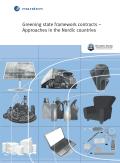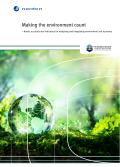Energy issues are also a high priority in the Nordic Council. In light of this, the Nordic Council’s Environment and Natural Resources Committee and Business and Industry Committee established a working group – the Energy Group – in the spring of 2015. The group was tasked with evaluating the need for Nordic co-operation on energy policy and developing proposals for how this co-operation can be developed going forwards. The Energy Group submitted its report in the spring of 2016.
The proposals put forward by the Energy Group are concrete and provide guidance as to how future co-operation on energy could be developed.
The green economy policy discourse has devoted a lot of attention to the design of public policy addressing low-carbon technologies. In this paper the researchers examine the impacts of public R&D support and feed-in tariff schemes on innovation in the wind energy sector. The analysis is conducted using patent application data for four western European countries over the period 1977–2009. Different model specifications are tested, and the analysis highlights important policy interaction effects. The results indicate that both public R&D support and feed-in tariffs have positively affected patent application counts in the wind power sector. The (marginal) impact on patent applications of increases in feed-tariffs has also become more profound as the wind power technology has matured. There is also some evidence of policy interaction effects in that the impact of public R&D support to wind power is greater at the margin if it is accompanied by the use of feed-in tariff schemes.

The purpose of this study was to clear out how Green Public Procurement has been realized in state framework contracts in the Nordic countries, to propose country-specific ways to improve the situation, and to draw a general model of efficient ways to realize green state framework contracts. The study was carried through in 2014 and 2015 by Bjørn Bauer and Rikke Fischer-Bogason (PlanMiljø, Denmark), Luitzen de Boer and Sigurd Vildåsen (Norwegian University of Science and Technology), and Timo Kivistö (Kivistö Consulting, Finland). The study was supervised by the Working Group of Nordic Council of Ministers for Sustainable Consumption and Production (i.e. HKP-group).

In 2013, the Nordic Ministers for the Environment decided to strenghten the measurement of green estimates of welfare and socio-economic developments. The report Making the Environment Count is describing how statistics on the environment and the economy thorugh the System of Environmental-Economic Accounts can be used to enable cross-sectorial analysis. The report proposes indicators that can be compiled annually in a Nordic context through existing statistics linking economic statistics to environmental statistics.
